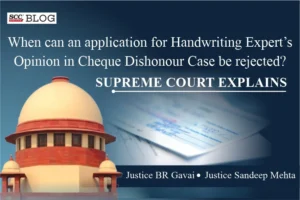Supreme Court: In a case where a cheque was dishonoured under Section 138 of the Negotiable Instruments Act, 1881 [NI Act] for “insufficient funds and account dormant” and the accused appellant had sought for a direction to obtain the opinion of the handwriting expert after comparing the admitted signature of the accused appellant and the signature as appearing on the disputed cheque, the bench of BR Gavai and Sandeep Mehta, JJ held that the appellant Court had rightly rejected the application under Section 391 CrPC as despite having opportunity, the accused appellant did not put any question to the bank official examined in defence for establishing his plea of purported mismatch of signature on the cheque in question.
The Court reiterated that the power to record additional evidence under Section 391 CrPC should only be exercised when the party making such request was prevented from presenting the evidence in the trial despite due diligence being exercised or that the facts giving rise to such prayer came to light at a later stage during pendency of the appeal and that nonrecording of such evidence may lead to failure of justice.
It is also pertinent to note that Section 118 sub-clause (e) of the NI Act provides a clear presumption regarding indorsements made on the negotiable instrument being in order in which they appear thereupon. Thus, the presumption of the indorsements on the cheque being genuine operates in favour of the holder in due course of the cheque in question which would be the complainant herein. In case, the accused intends to rebut such presumption, he would be required to lead evidence to this effect. Further, the Certified copy of a document issued by a Bank is itself admissible under the Bankers’ Books Evidence Act, 1891 without any formal proof thereof. Hence, in an appropriate case, the certified copy of the specimen signature maintained by the Bank can be procured with a request to the Court to compare the same with the signature appearing on the cheque by exercising powers under Section 73 of the Evidence Act, 1872.
Hence, in the case at hand, if the appellant was desirous of proving that the signatures as appearing on the cheque issued from his account were not genuine, then he could have procured a certified copy of his specimen signatures from the Bank and a request could have been made to summon the concerned Bank official in defence for giving evidence regarding the genuineness or otherwise of the signature on the cheque. However, despite having opportunity, the accused appellant did not put any question to the bank official examined in defence for establishing his plea of purported mismatch of signature on the cheque in question.
The Court, hence, held that the appellate Court was not required to come to the aid and assistance of the appellant for collecting defence evidence at his behest.
“The presumptions under the NI Act albeit rebuttable operate in favour of the complainant. Hence, it is for the accused to rebut such presumptions by leading appropriate defence evidence and the Court cannot be expected to assist the accused to collect evidence on his behalf.”
The Court, hence, upheld the Gujarat High Court order rejecting application preferred by the accused appellant under Section 482 read with Section 391 CrPC.
[Ajitsinh Chehuji Rathod v. State of Gujarat, 2024 SCC OnLine SC 77, decided on 29.01.2024]
Judgment Authored by Justice Sandeep Mehta
Know Thy Newly Appointed Supreme Court Judge – Justice Sandeep Mehta
Advocates who appeared in this case :
For Petitioner(s): Mr. Shariq Ahmed, Adv. Mr. Tariq Ahmed, Adv. Mr. Vinay Vats, Adv. Mr. Sunil Kumar Verma, Adv. Mr. Mayank Dubey, Adv. For M/s. Ahmadi Law Offices

